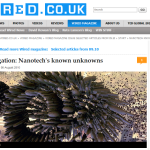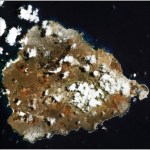environment
In his fine new book Vanished Ocean, geologist Dorrik Stow uses the biography of one of our planet's vanished oceans to teach the reader a wide range of veeery long-term perspectives on geological history. The ocean that geologists call the Tethys came into being when the Pangaea supercontinent coalesced in the Late Permian, 260 million years ago. Its last vestige finally disappeared when one of the Mediterranean sea's forerunners dried up 6.5 million years ago.
Along the way, Stow explains plate tectonics, the birth and death of seas, deep-sea sedimentation (his research speciality) and a…
By way of The Angry Bear, we come across this interesting abstract about the benefits of reducing congestion at toll plazas by using E-ZPass:
We find that reductions in traffic congestion generated by E-ZPass reduced the incidence of prematurity and low birth weight among mothers within 2km of a toll plaza by 6.7-9.1% and 8.5-11.3% respectively, with larger effects for African-Americans, smokers, and those very close to toll plazas. There were no immediate changes in the characteristics of mothers or in housing prices in the vicinity of toll plazas that could explain these changes, and the…
Maybe if the Obama administration and the Blue Dog (corporate) Democrats fought for an economic policy that made the middle-class' lives better, we wouldn't be faced with the looming political failure to deal with environmental problems. From Politico:
Most House Republicans envision killing Nancy Pelosi's special global warming committee if they claw their way back into the majority this November.
Wisconsin Rep. Jim Sensenbrenner wants to keep the Select Committee on Energy Independence and Global Warming alive so it can investigate climate science and police President Barack Obama's green…
I was mystified why Chief Teabagger David Koch would invest so much in a Smithsonian exhibit on human evolution — usually those knuckledraggers object to people putting their ancestry on display. An explanation is at hand, though: his big issue is denying the significance of global climate change, and the exhibit is tailored to make climate change look like a universal good.
There are some convincing examples of the subterfuge being perpetrated. There is a big emphasis on how evolutionary changes were accompanied by (or even caused by) climate shifts, which evolutionary biologists would see…
Those must have been some interesting meetings: the University of Minnesota administration was trying to suppress an environmentalist documentary about abuses of the Mississippi river, but every faculty member I've heard from on this issue was a bit outraged by the censorship…and now, the university has backed off, and the movie will be screened on 3 October at the Bell Museum. If you're in the area, stop by and watch it!
The Mississippi is a mess. I live in the agricultural, rural upper midwest, and one of the nasty surprises lurking beneath the rich green fields is that the rivers are ugly stews of fertilizers and herbicides and pesticides from agricultural runoff. We have data that it hurts people, too: premature births and birth defects show seasonal fluctuations that peak for children conceived in the spring and summer, when the chemicals are being sprayed into the air and are dribbling into the streams. The villains are agribusiness and overproduction and the corn ethanol boondoggle and horrors like the…
There are two quick and fairly easy approaches to reducing US emissions of CO2 by several percent. These reduction would be at the household level, possibly decreasing the household cost of energy by between 20 and 30 percent (or more, depending on the household) and decreasing national total CO2 emissions by around 10% or so.
But these approaches are nearly impossible to implement. Why? Because people are ignorant and selfish.
The two methods are: 1) Replace existing technologies with more efficient ones and 2) Use energy less. I'm not talking about replacing technologies at a…
In September Wired UK published my feature on the health risks of nanotechnology. The article is now online.
Nanotechnology's commercial growth has been accompanied by fears that it could damage human health and the environment. This in turn is stoking pressure on government and regulators to limit -- even ban -- a technology whose promise includes cleaner fuels, improved water filtration, better medicines, faster electronics and healthier foods.
Freshwater turtles are in serious trouble: about a third of the world's species are on the edge of extinction, and others are facing all kinds of problems. It's the usual litany: habitat destruction, over-hunting, the exotic pet trade, and of course, Chinese medicine (traditional Chinese medicine: where ignorance and superstition lead to gratuitous extinction events).
Turtles are an ancient clade — and the cause of their decline is clear and inarguable. It's us. I think I need to die before I have grandchildren so I don't have to explain to them how we screwed up their planet.
Two children are missing in Belize, and no one knows what happened to them. So a helpful 'psychic' declared that they had been fed to the crocodiles in a nearby sanctuary. The results were predictable.
Reports are that the mob shot and killed some of the 17 crocs held in captivity at the sanctuary. Also destroyed were the Rose's two story home that included a laboratory and nursery for baby crocs. One baby American Crocodile was to be flown to Chicago to the Wildlife Discovery Center in Lake Forest, Ill. USA for the first ever animal exchange program between Belize and the USA. Over $2,500 in…
Life transforms environments, creating ecosystems where there was once only rocks. The evolution of photosynthetic bacteria billions of years ago created the atmosphere we have today, paving the way for the evolution of larger, oxygen-breathing organisms. We humans obviously transform our environment in countless ways, but can we also engineer barren environments to be hospitable to life? Can we create new living, self-sustaining ecosystems in hostile places? Can we turn lifeless planets into second Earths through the clever introduction of life forms?
Terraforming is the (currently…
A gunman with an explosive device is holding hostages at the Discovery Channel building until they give him what he wants. What does he want? Well, he's nuts, and his
page of demands is loading very slowly, so here's what I was able to extract:
The Discovery Channel MUST broadcast to the world their commitment to save the planet and to do the following IMMEDIATELY:
1. The Discovery Channel and it's affiliate channels MUST have daily television programs at prime time slots based on Daniel Quinn's "My Ishmael" pages 207-212 where solutions to save the planet would be done in the same way as the…
BigThink has been having a Month of Dangerous Ideas, in which each day they publish a pro and con for a provocative idea, like "Tax Fat People" or "Mandatory Bible Study" (promoted to make people more moral, believe it or not), from which you'd get the impression it was mainly a month of stupid ideas. There were a few interesting ones in the mix, though.
One that comes up now and then again is the idea of Pleistocene Rewilding, that we should remove people from a wide strip of the center of the country, from North Dakota down to Texas in the more elaborate versions of the plan, and actively…
There's a terrific new article in New Scientist about some of the ways scientists are working on turning pee into energy. There's a lot of pee in the world all going to waste, often at huge cost to the environment in terms of energy used to collect and purify waste water. Methods that can produce even small amounts of power from urine could be useful to help power office buildings or farms where there are a lot of people or animals all peeing in the same place, and smaller fuel cells could even also be used to power portable electronics, with no need to carry any fuel or batteries, just a…
Everybody's favorite science-and-politics blogger has posted a video clip showing part of what's wrong in science communication. It's a clip from the BBC from last December, featuring one of those head-to-head quasi-debates about "Climategate" between Prof. Andrew Watson of the University of East Anglia and political consultant Marc Morano, who has made himself a nice little media niche as the go-to guy for climate change denial:
I don't think this is quite as damning as Chris says, but it's pretty bad. What you see here is a competition between a scientist and somebody who knows how the…
Quacks, every one, and monsters promoting destruction of the unique and precious. Look what they've done in the name of giving impotent, tiny-dicked ignoramuses a magic potion:
Poachers have butchered the last adult rhinoceros at a South African game reserve, cutting off her horn and letting her bleed to death, the chief game ranger says.
Rhino horns are just large lumps of keratin, nothing more. They do nothing to make men attractive, they don't enhance an erection, they don't increase desire. You might as well make a pill from ground-up fingernail clippings, it is the same thing.
But…
You know, every morning I get up and try to plow through the flood of email I get overnight, and it's always full of these dire stories and horrible events. So here I will share with you a little sense of how I feel when I open my mailbox.
It's amazing that I'm still such a happy fellow. I think the giggles are a consequence of being punch-drunk, though.
MPR picked my brains about the impossible plan to eradicate mosquitoes. No, we can't, and no, we shouldn't. That wasn't so hard.
Well, this was a weird article in Nature that made me think, at least: A world without mosquitoes. I was surprised to learn that there are actually ecologists/entomologists who believe the world would be a better place if we could simply exterminate entire genera of winged pests — that mosquitoes fill a readily replaceable niche, that they make minimal positive contributions to ecosystems, and we'd gain immeasurably from removing animals responsible for so much human suffering. The one thing they also agree on, though, is that there is no way to do it.
And so, while humans inadvertently drive…
Driving home with the Free-Ride offspring yesterday, we heard a story on the radio that caught out attention. (The radio story discusses newly published research that's featured on the cover of Nature this week.) When we got home, we had a chat about it.
Dr. Free-Ride: What did you guys learn from that story on the radio about the yellow-bellied marmot?
Elder offspring: That, in the short term, climate change is good for some species.
Dr. Free-Ride: Tell me more about that.
Elder offspring: Well, it made the marmots increase in size and numbers.
Elder offspring: I was going to say that!
.…


